Kokoro: A Japanese-Inspired Protein Bowl That Nourishes from Within
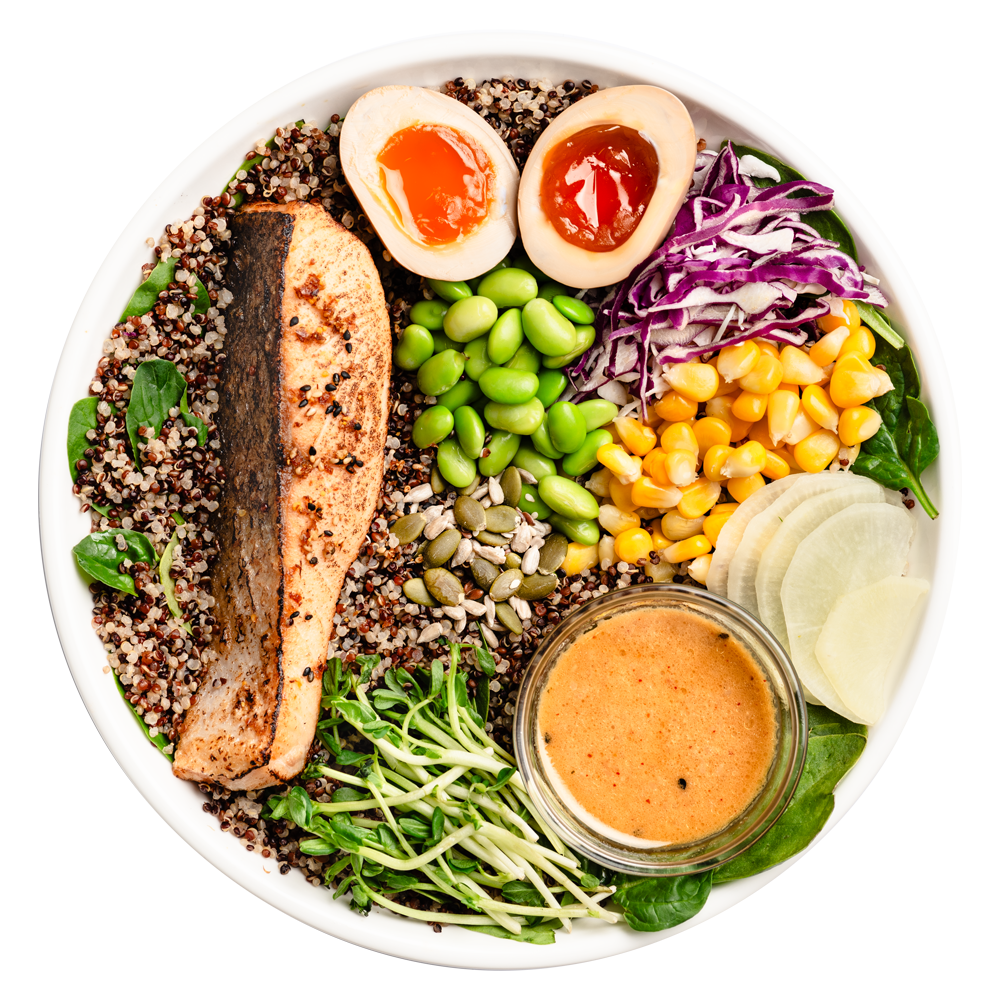
In Japanese, kokoro means “heart”—not just the physical organ, but the emotional and spiritual center of a person. It’s a word that embodies feeling, intention, and essence. That’s exactly the inspiration behind Kokoro, SaladStop!’s protein bowl that brings together wholesome ingredients, balanced nutrition, and bold Japanese flavors in a single, heartful meal. Crafted for those who seek a deeper connection between food and wellness, the Kokoro bowl is more than just a satisfying lunch—it’s a carefully curated dish that blends comfort, nourishment, and taste in every bite. A Closer Look at the Kokoro Bowl Ingredients Each component in the Kokoro bowl has been selected not only for its flavor and texture but also for its health benefits. 1. Sous-Vide Salmon At the center of the bowl is tender, slow-cooked sous-vide salmon, packed with omega-3 fatty acids that support brain function, reduce inflammation, and promote cardiovascular health. Moreover, this precise cooking method locks in moisture and flavor without added oils or sauces, allowing the freshness of the fish to shine through. 2. Organic Quinoa Serving as the warm base, organic quinoa brings a satisfying bite and a complete protein profile. In addition, rich in fiber, magnesium, and antioxidants, quinoa helps balance blood sugar levels and keeps you full longer—ideal for a midday power meal. 3. Baby Spinach & Red and White Cabbage Greens are essential to any well-rounded bowl. Baby spinach adds a soft, earthy touch, loaded with vitamins A and K, while shredded cabbage provides crunch, fiber, and powerful plant compounds that aid in digestion and detoxification. 4. Soft-Boiled Egg Perfectly cooked for a creamy yolk, the soft-boiled egg boosts protein and supplies important nutrients like choline and vitamin D. It also adds richness to the bowl, making it more satisfying and well-rounded. 5. Edamame & Sweet Corn A Japanese favorite, edamame (young soybeans) bring plant-based protein, fiber, and essential amino acids. Paired with sweet corn, which offers natural sweetness and a dose of antioxidants like lutein, this duo enhances both nutrition and flavor. 6. Pea Sprouts & Radish Pickles Pea sprouts deliver a fresh crunch and a surprising punch of vitamins A and C. Radish pickles, meanwhile, add a tangy pop that awakens the palate while contributing probiotics that support gut health—a nod to the Japanese art of fermentation. 7. Mixed Seeds & Furikake Sprinkled over the top are mixed seeds for texture and healthy fats, plus furikake, a classic Japanese seasoning blend made with nori, sesame, and dried herbs. It adds umami and crunch to every bite, tying all the flavors together. 8. Sesame Lime Dressing The bowl is finished with a refreshing Sesame Lime dressing, balancing richness and acidity. This vinaigrette cuts through the warmth of the bowl with brightness, while sesame oil offers a nutty aroma that evokes traditional Japanese flavors. Why Kokoro Stands Out The Kokoro warm protein bowl offers a balanced macronutrient profile—healthy fats from salmon and seeds, complex carbohydrates from quinoa and corn, and high-quality proteins from both plant and animal sources. It’sdesigned to nourish deeply, support sustained energy, and leave you feeling grounded and satisfied. For those seeking an anti-inflammatory, protein-rich, and gut-friendly meal, Kokoro checks all the boxes. It also suits a range of dietary preferences, from pescatarian to gluten-free, making it a smart and inclusive choice for today’s diverse eaters. Japanese-Inspired, Singapore-Crafted While inspired by traditional Japanese ingredients and techniques, the Kokoro bowl is very much rooted in SaladStop!’s mission: to provide food that is nutritious, sustainable, and full of purpose. Ingredients like organic quinoa and responsibly sourced salmon reflect SaladStop!’s ongoing commitment to environmental integrity and ethical sourcing. Each bowl is freshly prepared and customizable, so you can enjoy a nourishing meal that suits your lifestyle—whether you’re grabbing lunch on a busy workday or seeking a comforting dinner option. Make Every Meal Count In a fast-paced world where eating often feels rushed and mindless, the Kokoro bowl invites you to slow down and savor. It’s food that connects with the senses, crafted with care, and built on values that reflect your wellness goals. With SaladStop!’s wide selection of warm protein bowls, including the beloved Kokoro, it’s easier than ever to choose meals that are not only good for you—but also meaningful. Whether you’re focused on heart health, digestion, or simply enjoying flavorful food that energizes, Kokoro is a bowl that speaks to the heart of healthy eating.
Nutrigenomics: How Your Genes Influence Your Diet

In recent years, the intersection between nutrition and genetics has gained increasing attention, and for good reason. Nutrigenomics, the science of how genes interact with nutrients, offers a groundbreaking approach to personalized nutrition. Instead of following generic dietary guidelines, nutrigenomics empowers individuals to make food choices tailored to their genetic makeup, potentially optimizing health, preventing disease, and improving overall well-being. What Is Nutrigenomics? Nutrigenomics is the study of how food and nutrients affect gene expression. It operates on the principle that our genes influence how our bodies absorb, metabolize, and utilize nutrients. While all humans share a similar genetic framework, small variations called single nucleotide polymorphisms (SNPs) can lead to significant differences in nutritional needs and responses. For example, some people have a variation in the MTHFR gene that makes it harder for them to metabolize folic acid, a crucial B-vitamin. Others may have a genetic predisposition that affects how their body processes caffeine, sugar, or saturated fat. These genetic differences can make a one-size-fits-all approach to nutrition less effective or even harmful. How Genetics Impact Nutritional Needs Here are several ways in which your genes can shape your ideal diet: Benefits of a Nutrigenomics-Based Diet A diet informed by your genetic profile can offer several advantages: The Role of Technology and Personalized Nutrition Services The rise of digital health platforms and at-home DNA test kits has made nutrigenomics more accessible than ever. With just a saliva sample, you can unlock detailed insights about your genetic makeup and receive personalized nutrition reports. At SaladStop!, we are also advancing personalization through LULU, our AI-powered nutrition assistant. LULU helps you tailor meals to your health goals, dietary needs, and preferences, offering smarter and more flexible food choices. With access to hundreds of nutrient-dense ingredients and smart recommendations, LULU makes it easier than ever to create meals that align with your body’s needs. While SaladStop! does not yet offer genetic testing, our emphasis on nutrient-rich ingredients, sustainable sourcing, and customizable bowls supports a future where gene-informed eating can seamlessly integrate into everyday life. Whether you’re looking for high-protein, low-sugar, or anti-inflammatory options, LULU ensures your meals are both convenient and personalized. Should You Try Nutrigenomics? If you’re struggling with chronic health issues, unexplained fatigue, or plateaued weight loss despite a healthy lifestyle, it may be worth exploring nutrigenomic testing. Speak with a nutritionist or healthcare provider who can help you interpret the results and create a plan that aligns with your body’s genetic blueprint. However, nutrigenomics should complement, not replace, good dietary practices. A balanced diet rich in whole foods, fruits, vegetables, and lean proteins remains the cornerstone of health. Nutrigenomics is transforming the way we think about food and health. As we continue to understand the complexities of the human genome, personalized nutrition will become increasingly precise and effective. By aligning your meals with your genes, you’re not only fueling your body, you’re optimizing it. And while genetic testing provides one piece of the puzzle, smart food choices remain a daily decision. With LULU and SaladStop!, taking control of your nutrition has never been easier or more delicious.
Metabolism Boosting Nutritional Strategies

Nutritional Strategies for Boosting Metabolism A healthy metabolism is more than just a buzzword. It’s the body’s powerhouse for energy production, fat burning, and overall vitality. While genetics play a role in how fast or slow your metabolism works, daily choices such as what you eat and how you move have a significant influence. The good news is that with the right nutritional strategies, you can naturally enhance your metabolic function. 1. Prioritize Protein-Rich Meals Protein has the highest thermic effect of food (TEF), meaning the body burns more calories digesting protein compared to fats and carbohydrates. Eating enough protein throughout the day also helps maintain lean muscle mass and promotes satiety, reducing the likelihood of overeating. Examples: Lean poultry, salmon, tofu, eggs, and Greek yogurt are excellent choices. Keeping convenient protein-rich snacks like roasted chickpeas or hard-boiled eggs on hand makes it easier to stay fueled. 2. Embrace Whole Grains and Fiber Whole grains and high-fiber foods require more energy to break down than refined carbohydrates, helping boost calorie expenditure while keeping blood sugar stable. Fiber also supports gut health, which is closely linked to metabolic efficiency. Examples: Quinoa, brown rice, oats, sweet potatoes, and legumes are versatile staples. Pairing them with fresh vegetables adds even more fiber and micronutrients for sustained energy. 3. Don’t Skimp on Healthy Fats Fats are essential for hormone regulation, including those that affect metabolism. Omega-3 fatty acids from salmon, chia seeds, and walnuts are especially beneficial. Extra virgin olive oil (EVOO) is another excellent option that supports anti-inflammatory pathways and fat oxidation. 4. Stay Hydrated Water plays a critical role in metabolic processes. Even mild dehydration can reduce calorie-burning efficiency and cause fatigue. Some studies suggest that drinking cold water may provide a slight metabolic boost, as the body works to bring it to core temperature. Aim for at least 8 glasses per day, increasing intake if you’re active or in a warm climate. Herbal teas, fruit-infused water, and sparkling water are refreshing alternatives to plain water. 5. Spice Things Up Thermogenic spices like chili, cayenne, cinnamon, and ginger can temporarily raise body temperature, increasing calorie burn. While the effect may be modest, using these spices regularly adds up over time. They also enhance flavor without extra calories. Try sprinkling cayenne on roasted vegetables, adding cinnamon to oatmeal, or using ginger in stir-fries. 6. Time Your Meals Wisely Meal timing influences metabolism as much as food choice. Eating balanced meals every 3–4 hours helps stabilize blood sugar and maintain energy, keeping metabolism active throughout the day. Skipping meals may slow calorie burn and lead to overeating later. Simple, balanced snacks with protein and complex carbohydrates—like whole grain crackers with hummus—can prevent energy dips. 7. Support Gut Health The gut microbiome plays a key role in metabolic function. Fermented foods such as yogurt, kefir, kimchi, sauerkraut, and kombucha help promote a diverse gut flora, which in turn enhances nutrient absorption and energy regulation. Prebiotic foods like garlic, onions, asparagus, and bananas further support gut bacteria, creating a foundation for optimal metabolic health. Boosting metabolism isn’t about quick fixes or extreme diets—it’s about consistent, nutrient-dense choices. By focusing on protein, whole grains, healthy fats, hydration, spices, and gut health, you give your body the support it needs to stay energized and efficient. When time is tight, having access to nourishing meals that fit these principles makes a big difference. SaladStop! offers a variety of salads and warm protein bowls that combine whole grains, lean proteins, and healthy fats, making it easier to stay on track with your wellness goals while enjoying fresh, flavorful meals.
Game Changer: A Protein Bowl with a Punch

When it comes to rethinking what a protein bowl can be, the Game Changer from SaladStop! lives up to its name. It’s not your typical salad—it’s a bold, flavor-packed, plant-based bowl built for those who want substance, not just greens. With smoky BBQ pulled shiitake, fiber-rich cauliflower rice, spiced lentils, and a medley of vibrant vegetables, this dish proves that eating well doesn’t have to be bland or boring. It’s a satisfying, nutrient-dense option crafted for anyone looking to fuel up with purpose—without compromising on taste. A Closer Look at the Ingredients 1. BBQ Pulled Shiitake Forget pulled pork—BBQ pulled shiitake brings all the smoky, umami flavor with none of the meat. Shiitake mushrooms are not only rich in taste but also in health benefits. They’re known to support immune health, contain anti-inflammatory compounds, and provide a solid dose of B vitamins. Their meaty texture and bold BBQ seasoning make them a standout plant-based protein alternative. 2. Cauliflower Rice Low in carbs and calories but high in fiber, cauliflower rice is a favorite among those who want to lighten up their meals without sacrificing volume or satisfaction. It’s also a great source of antioxidants, particularly vitamin C and beta-carotene, helping combat oxidative stress. 3. Mixed Greens A fresh, crunchy medley of leafy greens serves as the base of the bowl, adding essential vitamins like K, A, and folate. Leafy greens also promote healthy digestion and help reduce inflammation, making them a cornerstone of any balanced meal. 4. Spiced Lentils Lentils are a nutrition powerhouse—rich in protein, fiber, and complex carbohydrates. The addition of spices boosts the bowl’s flavor profile while offering metabolic and digestive benefits. Lentils also support heart health and help regulate blood sugar, making them ideal for sustained energy. 5. Roasted Capsicum and Pumpkin Both of these roasted vegetables add natural sweetness and depth to the bowl. Pumpkin provides beta-carotene and supports eye and skin health, while capsicum (bell peppers) are packed with vitamin C, which aids in collagen production and immune defense. 6. Cherry Tomatoes and Thai Asparagus These fresh ingredients add brightness, crunch, and color. Tomatoes bring lycopene, a powerful antioxidant linked to reduced risk of chronic disease. Thai asparagus adds a gourmet touch while contributing fiber, vitamin K, and folate. 7. Mixed Seeds and Fresh Herbs The topping of mixed seeds (think pumpkin, sunflower, or chia) adds texture, healthy fats, and plant protein. Seeds are a rich source of magnesium, zinc, and omega-3s, helping to regulate mood and metabolism. Fresh herbs like parsley or cilantro add antioxidants and enhance digestion. 8. Green Harissa Vinaigrette This zesty, herbaceous dressing ties everything together. Harissa—a North African spice blend—delivers a kick of flavor with metabolism-boosting benefits. The vinaigrette is made with clean ingredients and brings boldness without overpowering the freshness of the bowl. Why It’s a Game Changer This bowl is more than the sum of its parts. It’s a macronutrient-balanced, anti-inflammatory, plant-based meal designed to fuel your body with purpose. With ample fiber, healthy fats, complex carbohydrates, and plant proteins, it helps to: Sustain energy levels throughout the day Support digestion and gut health Reduce cravings by keeping you full longer Boost immunity and mental clarity It’s also naturally free from refined sugars and artificial additives—a welcome bonus for those taking part in SaladStop!’s wellness initiatives like the 21-day no sugar challenge. A Smart Choice for Conscious Eaters Today’s consumers are looking for more than just a salad—they want meals that align with their health goals, ethical values, and fast-paced lifestyles. The Game Changer meets all three. It’s suitable for vegetarians and vegans, and thanks to its grain-free base, it can also fit into low-carb or paleo-inspired diets. As part of SaladStop!’s commitment to sustainability, ingredients like cauliflower rice, lentils, and seasonal produce are selected with care, ensuring that each bowl contributes not only to your health but also to the health of the planet. Make the Healthy Choice Simple Finding meals that strike the right balance—nutritionally robust, rich in flavor, and made responsibly—can feel like a challenge. That’s why SaladStop! continues to innovate with dishes like the Game Changer, a bowl that’s accessible, energizing, and deeply satisfying. Now available in-store, on delivery platforms and SaladStop pre-order site, the Game Changer is your go-to for an intentional, feel-good meal—no trade-offs, no shortcuts. Reframe how you nourish yourself—choose the bowl that does it all.
Exploring the World of Fermented Foods: Benefits and Varieties
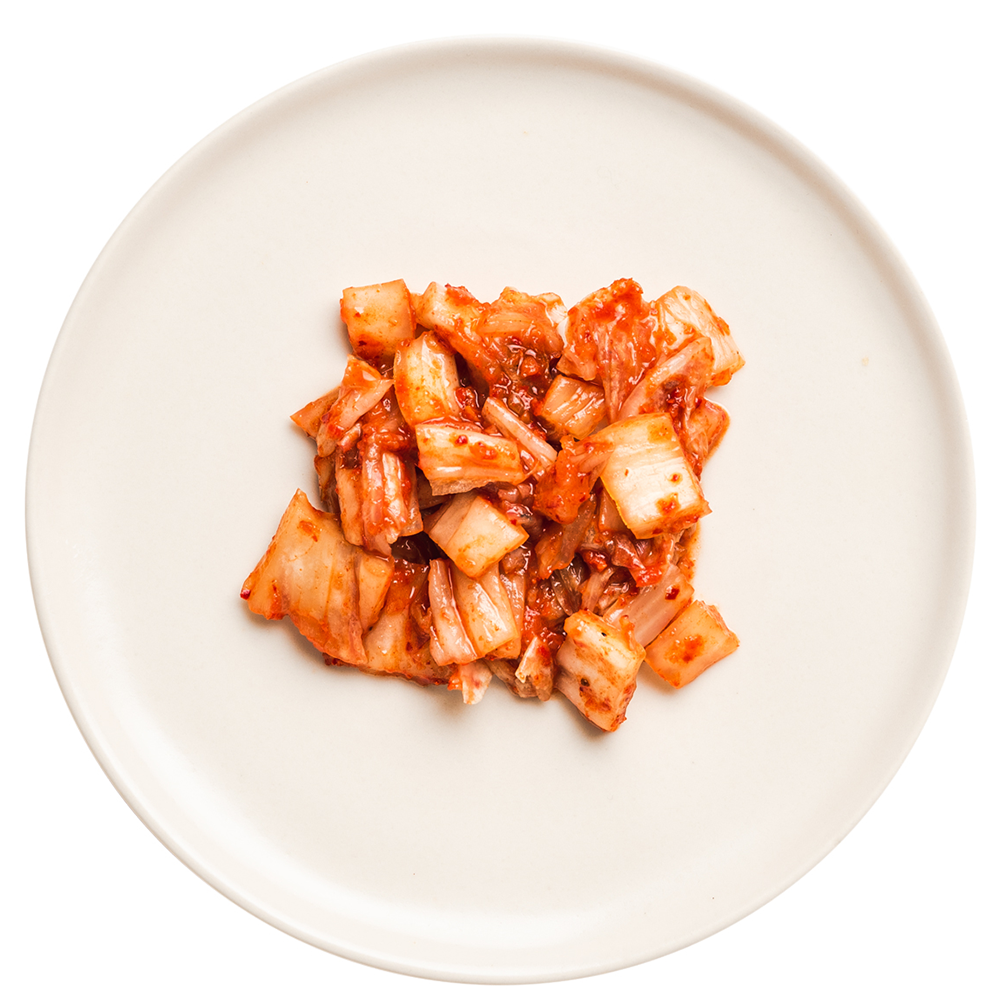
In recent years, fermented foods have gone from being traditional staples in various cultures to trending superfoods lining grocery store shelves. Centuries of health wisdom support this rise in popularity—and modern science is now catching up. From supporting gut health to enhancing nutrient absorption, fermented foods offer a natural way to boost your well-being. In this article, we’ll explore the benefits of fermented foods, the wide variety available globally, and most importantly, subtle ways to include them in your meals—whether you’re dining out, meal prepping at home, or building a personalized salad at places like SaladStop!, which also offers a range of house-made fermented options like kimchi and pickles. What Are Fermented Foods? Fermentation is a natural process in which microorganisms such as bacteria, yeast, and molds break down carbohydrates—like sugars and starches—into simpler compounds. This not only helps preserve food but also enhances its flavor, texture, and nutritional value. Some of the most common fermentation processes include lactic acid fermentation (used in yogurt, kimchi, and sauerkraut), acetic acid fermentation (used in vinegar and kombucha), and alcoholic fermentation (used in beer and wine). As a result, you get a tangy, flavorful product rich in beneficial compounds. Health Benefits of Fermented Foods 1. Gut Health Support Fermented foods are rich in probiotics—live bacteria that benefit the digestive system. In particular, these good bacteria help balance the gut microbiome, a community of microorganisms essential for digestion, nutrient absorption, immune response, and even mental health. 2. Improved Nutrient Absorption Fermentation can increase the bioavailability of vitamins and minerals. For example, fermented vegetables may offer more easily absorbable iron, calcium, and B vitamins compared to their raw counterparts. 3. Immune System Boost A balanced gut microbiome contributes to a strong immune system. By regularly consuming fermented foods, you may reduce inflammation and increase your body’s resilience to illness. 4. Natural Preservation The acids and antimicrobial compounds produced during fermentation naturally preserve the foods, making them a safer and more sustainable choice—free from artificial preservatives. 5. Enhanced Flavor and Satiety The bold, umami-rich flavor of fermented foods can elevate any meal while also promoting satiety, helping with portion control and mindful eating. Popular Types of Fermented Foods Around the World 1. Kimchi (Korea) Koreans prepare kimchi, a staple in their cuisine, by fermenting vegetables—usually napa cabbage and radish—and seasoning them with chili flakes, garlic, ginger, and fish sauce. It’s tangy, spicy, and full of probiotics. 2. Sauerkraut (Germany) This finely shredded cabbage fermented in its own juices is rich in fiber and vitamins C and K. It’s a versatile topping for sandwiches and grain bowls. 3. Yogurt and Kefir (Global) These cultured dairy products are fermented with specific strains of bacteria and are great sources of calcium, protein, and probiotics. Kefir contains a broader range of beneficial microbes. 4. Pickles (Various) Fermented cucumbers—often simply called pickles—are crisp, tangy, and make a perfect gut-friendly snack. Traditional pickling uses brine and natural fermentation rather than vinegar. 5. Miso (Japan) Made from fermented soybeans, miso is a paste used in soups, dressings, and marinades. It’s rich in umami flavor and contains beneficial enzymes and probiotics. 6. Tempeh (Indonesia) This protein-rich product made from fermented soybeans has a firm texture and nutty flavor, making it a popular meat substitute in plant-based diets. 7. Kombucha (China) A fizzy fermented tea, kombucha is brewed using a symbiotic culture of bacteria and yeast (SCOBY). It’s slightly sweet, slightly acidic, and rich in probiotics and antioxidants. Adding Fermented Foods to Your Diet Incorporating fermented foods into your daily meals doesn’t have to be complicated. You can start small by adding a spoonful of kimchi to your rice bowl, a side of sauerkraut to your sandwich, or a few pickled vegetables to your salad. At SaladStop!, customizing your own bowl or wrap means you can easily add probiotic-rich foods to your lunch. Options like house-made kimchi, brined pickles and miso-based dressings offer subtle but effective ways to enjoy the benefits of fermentation without changing your usual order. These not only add complexity to flavor but also enhance your gut health with every bite. You can even plan ahead and preorder your next gut-friendly meal here to save time and stay on track with your nutrition goals. Fermented foods are more than just a trend—they’re time-tested, nutrient-dense additions to a healthy diet. With benefits ranging from improved digestion to enhanced immunity, there’s every reason to give them a place on your plate. As awareness grows, so do the options for integrating these powerful foods into everyday meals. Whether you’re preparing them at home, exploring global cuisines, or customizing your lunch at SaladStop!, fermented foods offer a simple and delicious way to nourish your body from the inside out.
Mindful Eating Practices for a Healthier Relationship with Food

Developing a healthy relationship with food goes beyond simply choosing the right ingredients — it’s about the way we approach each meal. Mindful eating is a powerful practice that encourages us to be fully present during meals, helping us tune into our body’s natural signals and appreciate the nourishment food provides. By cultivating awareness around when, what, and how we eat, we can transform mealtimes into a source of satisfaction, balance, and well-being. Here’s how mindful eating can help improve your eating habits and support long-term health. 1. Make Time for Meals Carving out dedicated time for meals, even when life feels busy, is an important part of mindful eating. Sitting down for breakfast, lunch, or dinner — rather than grabbing a quick bite while multitasking — creates the space to enjoy your food and notice how it affects your body. This intentional approach can lead to better digestion, a stronger sense of satisfaction after eating, and more conscious food choices. It’s not about adding more to your schedule but about treating meals as an important part of your day. 2. Notice the Details of Your Food Mindful eating begins with observation. Before you take a bite, take a moment to look at your meal — the colors, the arrangement, and the aroma. As you eat, pay attention to textures, flavors, and the changing sensations in your mouth. This practice makes meals more enjoyable and helps you recognize what types of food truly satisfy you. Over time, you may find yourself gravitating toward meals that nourish both your body and your senses. 3. Listen to Your Body’s Signals Our bodies send clear messages about hunger and fullness, but it takes practice to notice them. With mindful eating, you learn to pause and check in with yourself: How hungry am I before I start eating? How does my body feel during the meal? Am I comfortably full, or do I need a little more? Responding to these cues helps prevent overeating and allows you to meet your body’s needs without guilt or restriction. 4. Create a Supportive Environment The space where you eat can influence how you eat. Choose a calm and pleasant setting — whether that’s at your dining table, at a cozy café, or on a park bench. Step away from work, screens, and distractions when possible. Restaurants that emphasize fresh, nourishing options, like SaladStop!, can make it easier to stay in tune with mindful eating principles even when dining out. Choosing meals made with whole ingredients and sustainable practices reinforces a thoughtful, intentional approach to food. 5. Approach Food Without Judgment Many people carry guilt or shame around their food choices, which can damage their relationship with eating. Mindful eating encourages a nonjudgmental attitude. Instead of labeling foods as “good” or “bad,” focus on how they make you feel physically and emotionally. By removing moral value from food, you can break free from cycles of restriction and overindulgence, ultimately developing a more balanced and sustainable way of eating. 6. Practice Gratitude Gratitude can deepen the mindful eating experience. Consider the effort and resources that went into producing your meal — from the farmers and producers to the people who prepared the food. A brief moment of thanks can create a meaningful connection between you and your food, reinforcing respect and appreciation for the nourishment you receive. The Benefits of Mindful Eating Practicing mindful eating over time can bring numerous benefits: Most importantly, mindful eating helps cultivate a peaceful, positive relationship with food that supports both physical health and emotional well-being. Mindful eating is not a quick fix or a rigid set of rules — it’s a lifelong practice of bringing awareness and care to your meals. Start with small changes, like noticing the taste of your food or checking in with your hunger level before eating. Whether you’re enjoying a homemade meal or a fresh, nutrient-packed salad or bowl from SaladStop!, mindful eating invites you to slow down, tune in, and nourish yourself in a way that feels good both physically and emotionally. By embracing these simple yet powerful practices, you can build a healthier, more joyful relationship with food — one mindful bite at a time.
The Impact of Omega-3 Fatty Acids on Cardiovascular Health
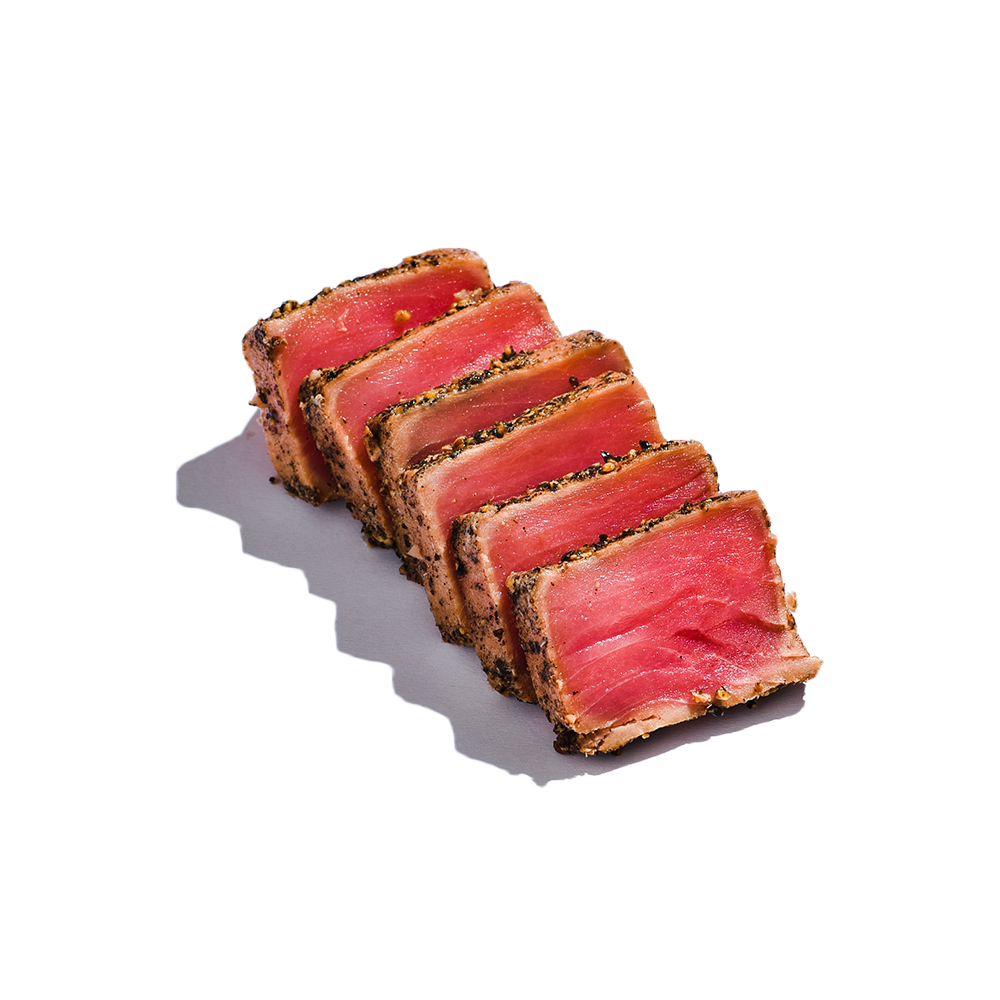
When it comes to protecting your heart, the food you eat can be one of your most powerful allies. While exercise and stress management play important roles, research continues to show that specific nutrients can make a measurable difference—especially omega-3 fatty acids. Known for their heart-protective properties, these essential fats are more than just a trend; they’re a scientifically backed way to support long-term cardiovascular health through simple, everyday choices. What Are Omega-3 Fatty Acids? Omega-3 fatty acids are a type of polyunsaturated fat that our bodies can’t produce on their own. The three most important types include: These fats are vital for brain development, inflammation control, and, notably, cardiovascular function. How Omega-3s Support Heart Health Numerous studies have demonstrated the powerful impact of omega-3 fatty acids on cardiovascular health. Here’s how they help: 1. Lowering Triglycerides High triglyceride levels can increase your risk of heart disease. Omega-3s, particularly EPA and DHA, have been shown to reduce triglyceride levels significantly—by as much as 30% in some cases. 2. Reducing Blood Pressure Regular consumption of omega-3s has been associated with modest reductions in blood pressure, especially among individuals with hypertension. This benefit is particularly valuable, given the strong link between high blood pressure and heart disease. 3. Preventing Arrhythmias Omega-3 fatty acids may help stabilize the heart’s electrical system, reducing the risk of arrhythmias (irregular heartbeats) that can lead to cardiac arrest. 4. Decreasing Inflammation Chronic inflammation is a key driver of many cardiovascular conditions. Omega-3s exhibit anti-inflammatory properties that help calm systemic inflammation, offering protection against the development of atherosclerosis (plaque buildup in arteries). 5. Improving Cholesterol Levels While omega-3s do not directly lower LDL (bad) cholesterol, they can increase HDL (good) cholesterol, contributing to better overall lipid profiles. Dietary Sources of Omega-3s The best way to boost omega-3 intake is through whole food sources: Making Omega-3s Part of Everyday Meals The key to reaping the cardiovascular benefits of omega-3s lies in consistency and variety. Whether you’re enjoying a salmon poke bowl for lunch or snacking on a handful of walnuts, small choices add up. At SaladStop!, for example, integrating omega-3 rich ingredients into bowls and salads is part of the brand’s commitment to nutritious and balanced meals. Options featuring ingredients like roasted almonds, edamame, flaxseeds, or premium sustainably-sourced tuna (such as in the Tuna San salad) provide heart-friendly nutrients without compromising on taste. These thoughtful ingredient choices reflect a broader philosophy—making healthy eating accessible and exciting. By choosing meals that combine flavor and function, you’re not just feeding your cravings, you’re fueling your wellness goals. Omega-3 fatty acids are one of nature’s most potent tools in the fight against heart disease. From reducing inflammation to improving lipid profiles and supporting stable heart rhythms, their cardiovascular benefits are extensive and well-documented. Incorporating omega-3-rich foods into your diet doesn’t have to be difficult or dull. Whether it’s through home-cooked meals, smart snacking, or health-focused dining options like those available at SaladStop!, small shifts in your diet can translate into major gains for your heart. By prioritizing nutrient-dense foods and understanding the science behind them, you’re investing in a healthier, stronger future—one delicious bite at a time. Whether you’re preparing meals at home or choosing convenient, balanced options on the go, every choice counts. For a quick, heart-healthy meal made with purposefully selected ingredients, order now at SaladStop! and enjoy food that’s good for your body and your heart.
Harvest Bowl: A Nutrient-Dense Hearty Delight
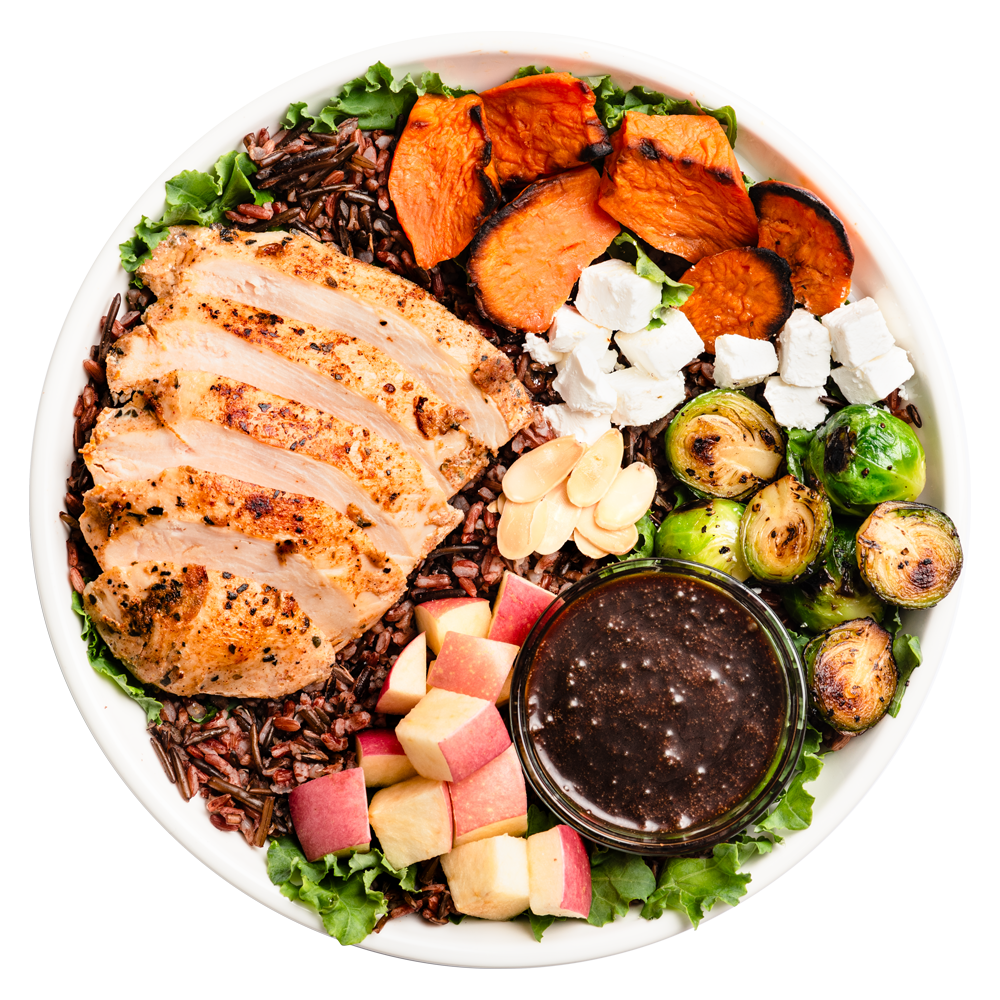
In a sea of salad choices, one warm bowl has earned its place as a customer favorite. Meet the Harvest Bowl—one of SaladStop!’s best-selling creations, beloved for its comforting flavors and nourishing ingredients. Designed to be both hearty and wholesome, this warm protein bowl is a go-to for anyone seeking a meal that satisfies cravings while supporting wellness goals. It’s not just popular—it’s a staple for those who value clean eating without compromising on taste. What Is the Harvest Bowl? The Harvest Bowl is a warm, satisfying dish designed to offer a complete meal in one bowl. It features a wholesome mix of sous-vide chicken, organic wild rice, kale, roasted sweet potatoes, Brussels sprouts, red apples, feta cheese, and toasted almonds, all brought together with a delicious Truffle Balsamic Vinaigrette made with extra virgin olive oil. This bowl was created for those who crave comfort food without compromising on nutrition. It’s filling, flavorful, and full of functional ingredients that support your overall health. Nutrient-Dense Ingredients That Make a Difference Each element of the Harvest Bowl was chosen for both its taste and its nutritional profile. Let’s break down the superstars in this warm protein bowl: 1. Sous-vide Chicken Sous-vide cooking ensures that the chicken stays juicy and tender without the need for excessive oil or high-heat cooking methods. Packed with lean protein, chicken helps build and repair muscle, keeps you fuller for longer, and supports metabolic function. 2. Organic Wild Rice Unlike refined grains, organic wild rice is high in fiber, antioxidants, and B vitamins. It’s a fantastic source of complex carbohydrates, which provide sustained energy and help regulate blood sugar levels. 3. Kale One of the most nutrient-dense vegetables on the planet, kale delivers a powerful punch of vitamin K, vitamin C, calcium, and fiber. It’s also known for its anti-inflammatory and antioxidant benefits, which support everything from brain health to immune function. 4. Roasted Sweet Potatoes Sweet potatoes are a rich source of beta-carotene (vitamin A), potassium, and fiber. They provide slow-digesting carbohydrates that fuel the body while promoting gut health and helping regulate blood pressure. 5. Brussels Sprouts Cruciferous vegetables like Brussels sprouts are loaded with glucosinolates, compounds that support detoxification and hormonal balance. They’re also high in vitamin C and folate, crucial for skin health and cellular repair. 6. Red Apples These fresh, crisp fruits add a natural sweetness to the bowl along with a healthy dose of soluble fiber (especially pectin), which supports digestion and helps manage cholesterol levels. 7. Feta Cheese Feta adds a creamy, tangy flavor while contributing a good amount of calcium, phosphorus, and B vitamins. It also supports gut health thanks to its fermentation process. 8. Toasted Almonds These nutrient powerhouses bring crunch and heart-healthy monounsaturated fats, along with vitamin E, magnesium, and plant-based protein. 9. Truffle Balsamic Vinaigrette (Made with EVOO) Our signature vinaigrette ties it all together with the richness of truffle and the benefits of extra virgin olive oil (EVOO). EVOO is loaded with polyphenols, which are powerful antioxidants known to support heart health, reduce inflammation, and even protect against cognitive decline. Why Choose the Harvest Bowl? If you’re looking for a meal that checks all the boxes—flavor, fullness, and functional nutrition—the Harvest Bowl delivers. It’s gluten-free, balanced in macronutrients, and ideal for a post-workout meal, a cozy lunch, or a power-packed dinner. Benefits of the Harvest Bowl: A Perfect Fit for Your Healthy Lifestyle The Harvest Bowl is part of SaladStop!’s mission to make clean, conscious eating both convenient and craveable. Whether you’re following a wellness plan, eating intuitively, or simply trying to get more greens in your diet, this warm protein bowl is a smart and satisfying choice. You can enjoy it in-store, order it online for pickup or delivery, or even include it in your weekly routine through SaladStop!’s meal subscriptions. Try the Harvest Bowl Today Craving something warm, wholesome, and nutrient-packed? The Harvest Bowl is ready to meet you wherever you are in your wellness journey. From its thoughtfully sourced ingredients to its deliciously bold flavor, it’s a bowl that not only tastes good—it does good for your body. Try it now here!
The Role of Dietary Fiber in Preventing Chronic Diseases
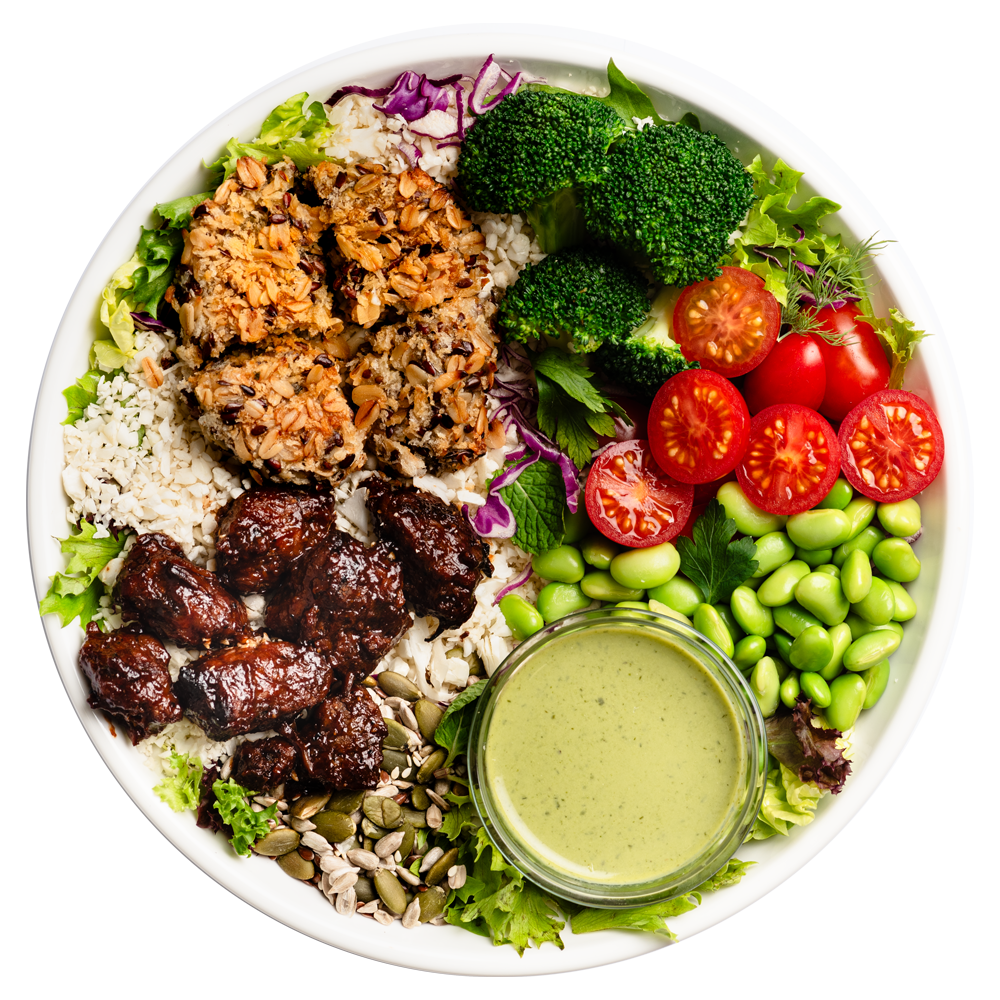
Chronic diseases such as heart disease, type 2 diabetes, and digestive disorders continue to rise globally, often linked to poor diet and sedentary lifestyles. While many factors contribute to long-term health, one simple yet powerful element often goes overlooked—dietary fiber. Found naturally in plant-based foods, fiber doesn’t just support digestion; it plays a protective role against some of the most common chronic illnesses affecting people today. Understanding its benefits and incorporating it into your daily meals can make a significant impact on your long-term well-being. Despite its proven benefits, fiber is one of the most under-consumed nutrients in modern diets. According to global dietary surveys, the average person consumes far less than the recommended 25–38 grams per day. So why does fiber matter so much, and how can you make sure you’re getting enough—especially in a way that’s both convenient and delicious? Let’s take a closer look. What Is Dietary Fiber? Dietary fiber refers to the parts of plant foods that your body can’t digest or absorb. Unlike fats, proteins, and carbohydrates, fiber isn’t broken down and absorbed by the body. Instead, it passes relatively intact through your stomach, small intestine, and colon. Fiber is typically categorized into two types: Both types are essential for optimal health. How Fiber Helps Prevent Chronic Diseases 1. Supports Heart Health Soluble fiber has a proven track record in reducing LDL (bad) cholesterol levels. It binds to cholesterol particles in the digestive system and helps remove them from the body before they can enter the bloodstream. Studies have shown that increasing fiber intake—particularly from whole grains, legumes, fruits, and vegetables—can significantly reduce the risk of cardiovascular disease. 2. Regulates Blood Sugar Fiber, especially soluble fiber, slows down the digestion and absorption of sugar, preventing sharp spikes in blood glucose levels. For people with type 2 diabetes, a high-fiber diet can improve glycemic control. For everyone else, it can help reduce the risk of developing insulin resistance and diabetes over time. 3. Aids in Weight Management Fiber-rich foods are typically more filling and less calorie-dense. That means they help you feel fuller for longer, naturally curbing appetite and reducing the likelihood of overeating. In fact, people who eat high-fiber meals tend to consume fewer calories overall, which can support sustainable weight management and reduce the risk of obesity. 4. Promotes Gut Health Insoluble fiber adds bulk to the stool and promotes regular bowel movements, which helps prevent constipation and supports a healthy digestive tract. Meanwhile, certain types of soluble fiber act as prebiotics, feeding the beneficial bacteria in your gut. A balanced gut microbiome is closely linked to improved immune function, reduced inflammation, and even mental well-being. 5. May Lower Cancer Risk There is emerging evidence that a fiber-rich diet may help lower the risk of certain types of cancers, particularly colorectal cancer. Fiber speeds up the passage of waste through the digestive system, reducing the time harmful substances stay in contact with the intestinal lining. Getting More Fiber into Your Diet Adding more fiber to your meals doesn’t have to be difficult. Start with small, consistent changes like: Build Your Own High-Fiber Bowl at SaladStop! If you’re looking for a quick, tasty, and customizable way to boost your fiber intake, SaladStop! has you covered. With our Create Your Own (CYO) bowl option, you can load up on fiber-rich ingredients like kale, broccoli, chickpeas, red quinoa, lentils, chia seeds, and more. Whether you’re aiming to support heart health, manage blood sugar, or simply improve digestion, our CYO bowls let you take control of your nutrition—without sacrificing flavor. Start crafting your perfect high-fiber meal today by visiting our Create Your Own Bowl page and exploring the wide range of wholesome, plant-powered ingredients available. Incorporating more dietary fiber into your daily routine is a small change with powerful long-term health benefits. From protecting your heart to keeping your gut microbiome thriving, fiber plays a vital role in disease prevention and overall wellness. By making fiber a consistent part of your meals—whether at home or with a nourishing bowl from SaladStop!—you’re investing in a healthier, more resilient future.
The Role of Mitochondrial Nutrition in Energy Production

Mitochondria is the powerhouse of the cell. They play a crucial role in energy production. Understanding mitochondrial nutrition is essential for optimizing energy levels and overall health. Mitochondria convert nutrients from food into adenosine triphosphate (ATP), the energy currency of the body. This article explores the role of mitochondrial nutrition in energy production and its implications for health. What Are Mitochondria? Nearly all eukaryotic cells contain mitochondria, which are organelles. They have a unique structure, consisting of two membranes. The smooth outer membrane contrasts with the highly folded inner membrane, which forms structures called cristae. These cristae, therefore, increase the surface area for chemical reactions. Additionally, mitochondria contain their own DNA, which is separate from the cell’s nuclear DNA. This unique feature allows them to replicate independently. Energy Production and ATP The primary function of mitochondria, therefore, is to produce ATP. They achieve this, in turn, through a process called oxidative phosphorylation. This process occurs in the inner mitochondrial membrane. Here, electrons derived from nutrients are transferred through a series of protein complexes. As electrons move through these complexes, they release energy. The energy pumps protons across the inner membrane, creating a proton gradient. The return flow of protons into the mitochondrial matrix drives ATP synthesis. The mitochondria release ATP into the cytoplasm, where it fuels various cellular processes. As a result, this entire process highlights the importance of mitochondrial health for energy production. The Impact of Nutrition on Mitochondrial Function Nutrition plays a significant role in mitochondrial function. The types of nutrients consumed, therefore, directly influence ATP production. Specifically, mitochondria primarily use carbohydrates, fats, and proteins as fuel sources. Each nutrient goes through different metabolic pathways to produce energy. 1. Carbohydrates: Carbohydrates are broken down into glucose. Glucose enters glycolysis, a process that takes place in the cytoplasm. The end products of glycolysis are pyruvate and ATP. The mitochondria convert pyruvate into acetyl-CoA. This compound enters the citric acid cycle, generating more ATP. 2. Fats: Fats are metabolized through a process called beta-oxidation. The body breaks down fatty acids into acetyl-CoA, which then enters the citric acid cycle. Fats provide a more concentrated energy source compared to carbohydrates. This makes them an important fuel for prolonged physical activity. 3. Proteins: Proteins can also serve as an energy source. However, they are primarily used for tissue repair and growth. Amino acids are converted into various intermediates that enter the citric acid cycle. Key Nutrients for Mitochondrial Health Several nutrients support mitochondrial function and energy production. These include vitamins, minerals, and antioxidants. Here are some key nutrients essential for mitochondrial health: 1. B Vitamins: B vitamins, particularly B1 (thiamine), B2 (riboflavin), B3 (niacin), B5 (pantothenic acid), and B7 (biotin), are vital for energy metabolism. They act as coenzymes in various metabolic pathways, assisting in the conversion of nutrients into ATP. 2. Coenzyme Q10 (CoQ10): CoQ10 is a powerful antioxidant found in the mitochondria. It plays a crucial role in the electron transport chain, facilitating ATP production. CoQ10 levels decline with age, making supplementation beneficial for mitochondrial health. 3. Magnesium: Magnesium is a key mineral involved in ATP production. It serves as a cofactor for over 300 enzymatic reactions, including those in energy metabolism. 4. Antioxidants: Mitochondria generate reactive oxygen species (ROS) during energy production. High levels of ROS can damage mitochondrial DNA and proteins. Antioxidants like vitamins C and E help neutralize these free radicals, protecting mitochondrial health. The Effects of Poor Mitochondrial Nutrition Poor nutritional choices can lead to impaired mitochondrial function. Diets high in refined sugars and unhealthy fats can hinder energy production. This can result in fatigue, reduced physical performance, and increased risk of chronic diseases. Furthermore, mitochondrial dysfunction is linked to various health issues. Conditions such as diabetes, obesity, and neurodegenerative diseases have mitochondrial components. Therefore, optimizing mitochondrial nutrition is essential for preventing these conditions. Strategies for Supporting Mitochondrial Nutrition Mitochondrial nutrition plays a crucial role in energy production and overall health. Understanding the relationship between nutrition and mitochondrial function empowers individuals to make informed dietary choices. By prioritizing nutrient-rich foods, individuals can support their mitochondrial health and enhance energy production. This, in turn, promotes vitality and well-being in daily life. If you’re looking to optimize your mitochondrial health through diet, using tools like the SaladStop! Nutritional Calculator can help you track the nutrients in your meals and make healthier, more informed choices. It’s a great resource for personalizing your diet to support both energy levels and overall well-being. You can try it out here: SaladStop! Nutritional Calculator.

